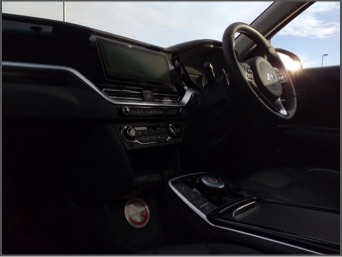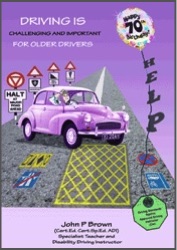For others it may involve adapting their driving to suit current abilities, implementing plans such as avoiding rush hour, using quieter routes even if the journey takes longer or planning routes where right turns are traffic light controlled.
If you are contemplating learning to drive or wanting to assess and develop your driving skills it’s often best to have a chat about it all first. Always feel free to ring me. If you can’t get hold of me it just means I’m teaching. Leave me a message and I will get back to you. I also have a profile on the specialist Disability Driving Instructors website.
:)
Rob Cooling ADI
Automatic Driving Instructor in Nottingham
Many elderly drivers can adapt to
driving in their later years and can be
safer than other age groups. They
have much to give and contribute
positively to the UK roads.


The areas I cover in Nottingham vary based on my current availability but include Stapleford, Beeston, Toton, Chilwell, Long Eaton, Sawley, Wollaton, Bramcote, Sandiacre, Trowell, Draycott, Breaston, Risley, Ockbrook, Attenborough, Borrowash, Aspley, Strelley and Bilborough. Nottingham postcodes covered for driving lessons are NG9, NG10 and partially NG8 and DE72 but outside of this I do offer meeting points for pupils travelling into my catchment area.
Please note I only teach automatic driving lessons but can happily provide manual driving school recommendations. For more details visit my contact me page.
It is important to keep up to date of new methods and relevant knowledge as many aspects of driving have changed over the years. Road systems are constantly evolving, traffic density increases and technology moves on.
Everyone’s situation is different so it is important to assess and create a goal based plan on an individual basis, avoiding any ‘one size fits all’ mentality. For some people the ageing process may mean it is time to give up driving. This can be a difficult and upsetting decision, often stressful for the whole family. People don’t give up their freedom without a fight, they will need a plan on how to adapt to life without a car.
DVLA data shows elderly drivers are in fact safer than most other age groups, their years of experience being used to outweigh age related problems. There are now more than seven million drivers over the age of 65 on the UK’s roads.
If an elderly driver is showing signs of difficulty with their driving, it is often the surrounding family who will begin to look for help. It can be a challenging and stressful time, many will not want to acknowledge the problem as they will fear losing the independence that driving brings them. Some elderly drivers may be called up by the DVLA for a driver assessment based either on driving ability or whether a medical condition is affecting their driving. A driver assessment is conducted like an informal driving test with a different marking system, John Brown’s book covers this in better detail.
Back in 2012 I read John Brown’s excellent book ‘Driving is Challenging and Important for Older Drivers’. I decided this was an area I wanted to expand into alongside working with those with special needs / learning difficulties. I would like to take this opportunity to recommend the book to anyone who is proactively keen to remain safe in their later years, or to anyone who is trying to support someone in this scenario. The book is pictured and if clicked on it will link you to John Brown’s website.
Some more mature drivers find they have lost their confidence in our ever evolving and complex road system. A refresher training course tailored to their needs can help develop their competence and confidence, also reducing the risk of accidents later in life.
Senior citizens will understandably feel the need to drive to maintain an independent lifestyle. Although the accident rate does increase after age 70 it is not necessarily a reason to stop driving, more a reason to update driving skills and prepare for potentially many more years of happy motoring. Families who are concerned about the driving standards of a relative will often struggle to find guidance on this topic.
Learning to drive later in life could be a great time to take a driving course as the individual may have more time and it could be a goal they have always hoped to achieve. It is always good to have a positive motivation for learning any subject.
Unfortunately it is not unusual for someone to find themselves having to learn to drive or refresh their driving skills due to partner illness, loss of a partner or suchlike leading to the need for self independence on the roads. Learning to drive later in life can help to maintain someone's quality of life or achieve other goals they are interested in.
Some elderly drivers recognise the deterioration in their driving and self-regulate the problem, often changing when and where they drive to manage their potentially slower reactions. However not all elderly drivers do this and it can be difficult for them and their family to find suitable advice and guidance.
As we all age, mental and physical abilities naturally begin to deteriorate. However many elderly drivers continue to remain safe well into their later years. At age 70 the driver must renew their driver licence, then every 3 years they must self-certify fitness to drive. Regardless of age all motorists must declare to the DVLA any medical conditions which could affect their driving, you can learn more about this by following this link : https://www.gov.uk/health-conditions-and-driving. It is also important to maintain regular hearing and eyesight checks, learn about the requirements here : https://www.gov.uk/driving-eyesight-rules.

